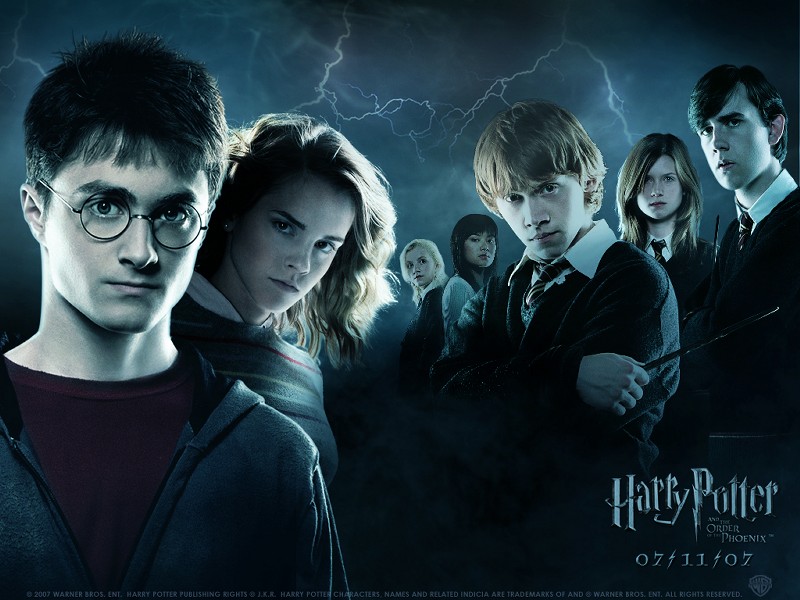>
The magically moving portraits are pulled off the walls of Hogwarts in 2007’s HARRY POTTER AND THE ORDER OF THE PHOENIX, and the colors have started draining from the Potter universe. Gone are the lush visuals of Prisoner of Azkaban and Goblet of Fire; the palette of Slawomir Idziak’s photography (his films include Kieslowski’s great Decalogue and also Black Hawk Down) is dominated by grays, blacks and browns. The visual message is clear: we’re not in a kiddie movie franchise anymore.
The pastel exception to these subdued hues, of course, is the pink favored by Dolores Umbridge (Imelda Staunton), the smiling, giggling gorgon who becomes the latest Defense Against the Dark Arts professor at Hogwarts as a stepping stone on her way to fascist dictatorship. Umbridge, even with her tortures significantly toned down from those in J.K. Rowling’s book, is one of the author’s most frightening creations, beautifully realized by Staunton.
In franchise terms, the biggest development on Order of the Phoenix was the decision to hire David Yates as house director for the remainder of the series. Yates was hardly an obvious choice, having never directed a feature film before (his most notable credit was the BBC version of State of Play, later–and badly–remade by Hollywood); there was concern when he was named that the studio had chosen a TV hack whose main interest would be keeping on budget as he rattled through the script pages. Yates, though, has been creative and wholehearted in embracing the darkness of the story’s later chapters; Order of the Phoenix isn’t as dramatically satisfying as the more epic Goblet of Fire, but it’s emotionally fierce. And despite the overall sense of desolation, Yates is able to vary the moods where needed, supplying one of the most rousing sequences in the whole series with the montage of Harry’s illicit Order of the Phoenix training sessions (helped tremendously by the excellent Nicholas Hooper score–he had worked frequently with Yates in TV).
Order of the Phoenix is also notable as the only Potter film not written for the screen by Steve Kloves (he pleaded exhaustion after 4 giant films in a row, but returned for the final 3 chapters). Michael Goldenberg handles the script instead, and the segue is just about seamless. Goldenberg only makes one structural misstep: by omitting the admittedly complicated backstory of the prophecy that’s at the core of the Phoenix story, he makes the revelation of its contents feel somewhat anti-climactic, and that makes the huge battle scene and major death that follow seem like special effects merely for the sake of spectacle.
At this point in the saga, most of the major characters had been introduced, but in addition to Umbridge, we do get Evanna Lynch as the ineffable Luna Lovegood, and Helena Bonham Carter as the utterly insane Bellatrix Lestrange. This is also one of the chapters where Alan Rickman gets to do more than swat students whispering in Potions class, and his angry training sessions with Daniel Radcliffe are among the best scenes in the film. With such regulars as Dumbledore and Hagrid out of the picture for much of this story, the bulk of the dramatic heavy lifting is handled by the story’s young stars, who by now are more than able to bear the burden.
Order of the Phoenix is where the Potter franchise could easily have gone wrong, with a slew of major creative changes and a drastic shift in story tone. Instead, the series seemed stronger than ever as it started to head into its home stretch, with stability both at the boxoffice ($43M higher than the previous chapter) and in the director’s chair.
HARRY POTTER RETROSPECTIVE REVIEWS
Harry Potter and the Sorcerer’s Stone
Harry Potter and the Sorcerer’s Stone
Harry Potter and the Chamber of Secrets
Harry Potter and the Prisoner of Azkaban
Harry Potter and the Goblet of Fire
Harry Potter and the Order of the Phoenix
Harry Potter and the Half-Blood Prince
Harry Potter and the Deathly Hallows (Part 1)





